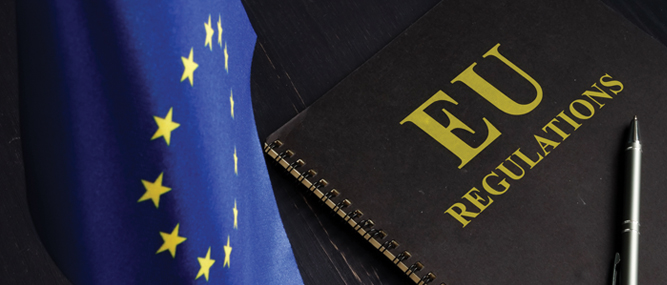It looks like the global wood pallet industry dodged a bullet with proposed Packaging and Packaging Waste Regulations (PPWR) being developed in Europe. The National Wooden Pallet & Container Association (NWPCA) in concert with the Global Wood Packaging Forum, the Canadian Wooden Pallet & Container Association and various government representatives have secured an exemption for PPWR regulations for wood pallets coming from outside of the European Union. The major concern for global shippers as well as packaging providers is the potential disruption in global supply chains and the ability to meet the requirements, which many manufacturing regions may struggle to accomplish, especially in a timely manner.
The PPWR were originally designed to reduce packaging waste through recycling and reuse efforts. The rules establish reuse targets for almost all packaging, including pallets. While the major focus of the legislation is to reduce plastic packaging waste, the rules were applied in such a way to cover a lot of other material and packaging categories as well.
Officials in the EU were leaving specific definitions of reuse up to specific industries and stakeholder partners based on real world conditions. But one major requirement in the PPWR is that packaging compliance needs to be able to be verified. For pallets this would likely require tracking of each cycle of a pallet so that it is reused a minimum number of times. For example, the European Pallet Association (EPAL), which runs the popular EPAL pool, has come out with a new QR code serialization system so that each pallet can be tracked, and data can be cataloged in a central database of pallet activity.
A major problem with compliance for U.S. pallet manufacturers is that only a handful of companies are now authorized to produce official EPAL pallets for example. These pallets require mechanization and tight tolerances to produce. It is possible that U.S. pallet companies could comply. But it certainly requires a lot more effort than just producing pallets for the U.S. domestic market. The good news for the global supply chain is that the final legislation that has been agreed to by the European Commission, the European Parliament and the member states in the Council of the EU contains a provision to restrict the requirements to “within the territory of the Union” to exempt pallets while in use entering and leaving the EU.
Once a load gets to the EU, it appears that it will likely be offloaded and put on a certified reuse platform such as EPAL or EUR pallets. Companies buying products from regions outside of the EU may still require compliance so that a load can easier flow through ports and the supply chain. But they will have to pay more for this convenience, and it will be something they have to factor into their global purchasing decision matrix. Especially for major brands looking for Environmental, Social and Governance (ESG) credit, some pallet buyers/product manufacturers may offer this service to retail and wholesale customers in Europe. As a result, it wouldn’t be surprising for some companies shipping from the United States to Europe to request EPAL or EUR pallets. But this is completely up to their discretion and will not be mandated by law.
The NWPCA just announced, “We are thrilled to report that the ‘within the territory of the Union’ is in the final negotiated language…This exemption is a clear win for wooden pallet manufacturers globally. Any pallet manufacturer building pallets that ship goods into or out of the EU will be exempt from challenging, costly and new reuse requirements. This will minimize disruptions to the supply chains and protect the pallet industry.”
Going into these three-way negotiations, only the EU Parliament had officially proposed to add the limiting language. But the NWPCA undertook a considerable advocacy and awareness building campaign last year that underscored the unintended harm the broader language could have on European companies and citizens if the restrictions led to slowdowns or disruptions in global deliveries.
The final language still must be adopted by the three major branches of government in Europe. The NWPCA suggested this is a formality expected to occur without a problem. But the NWPCA did warn, “However, in politics and an election year, anything is possible.”





